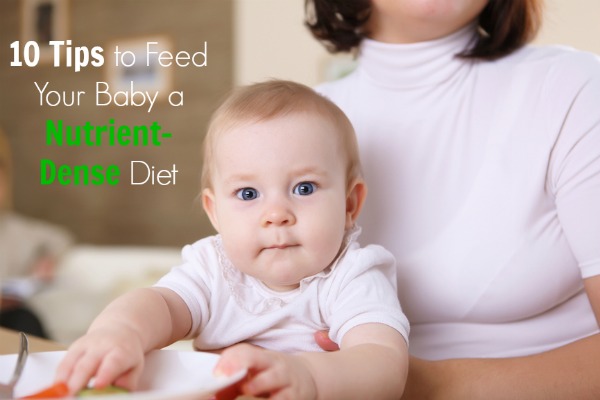10 Tips to Feed Your Baby a Nutrient-Dense Diet
The following is a guest post from Lauren, who blogs at Mindful Mama. She has some wonderful tips on feeding your baby a nutrient-dense diet and why it’s so important. Check out her blog for more great recipes and posts!
Fast-forward through the chaotic, starry-eyed, and sleepless months of infancy and, before you know it, you’re faced with the new, exciting, and confusing stage of feeding your baby. Hopefully, breastfeeding has been a treasured and successful relationship that will continue with you and baby for many more months. No matter your feeding choice up until now, what you do and don’t do from this strategic point on with feeding will have significant importance on the further development of your child’s health.
Why Are Chronic Childhood Conditions so Prevalent?
According to the book Super Nutrition for Babies, among Western children, many suffer from chronic childhood conditions, also called “3 C Conditions”:
- 1 in 3 kids have food intolerance
- 1 in 5 children have eczema
- 1 in 8 children have asthma
- 2 in 5 kids have seasonal allergies
Taking an honest look at the health of American kids, statistically these problems seem almost unavoidable. However, what if the foods we feed our babies, the foods we don’t feed them, and how we go about doing so, are contributing factors to whether or not our children develop these chronic problems?[1][2]
Looking Back to Traditional Diets
The health of primitive people who consumed traditional diets remind us that our babies are not automatically destined to these pervasive chronic problems, rather they can be a beautiful picture of health and vibrancy. Let us look back to the time when our diet wasn’t made up of 70% processed foods, and remember what we have forgotten in the last hundred years or so about real food and its connection to our health.[3]
10 Tips to Feed Your Baby a Nutrient-Dense Diet
Drawing from the wisdom of cultures past, before the confusion of labels and food science, here are 10 principles to adopt with hopes of not just helping your baby to survive, but to thrive!
- Be hesitant to follow mainstream nutritional advice. If you feed your baby as the typical baby eats in America, you’re baby will become a processed food junkie. The usual ‘baby foods’ are wrapped up in cutesy little wrappers and marketing slogans, promising to offer your baby the best nutrition—when in reality they offer very little whole-food nutrients.[4]
- Observe your baby’s food readiness signs. Babies who sit unassisted or with minimal support, open their mouths when food approaches them, can close their lips around a spoon and seem interested when others are eating are showing food readiness signs. If they are 6 months and are showing these signs, proceed with introducing solids. [5]
- Avoid feeding your baby commercial formula. It’s loaded with synthetic vitamins and GMO food-products that are overly heated, processed and devoid of any real nutrition by the time they reach your baby. Make homemade formula instead if you are absolutely unable to breastfeed – it may seem inconvenient at first, but the nutrient-density you will be offering your baby will be well worth it. [6]
- First foods should be animal foods. Often in the American culture the opposite is followed. “Animal foods are higher in age-critical minerals than are grains, fruits and veggies.” As well as their high nutrient-density, animal foods contain all essential amino acids, have unique nutrients not found elsewhere, provide antioxidants and offer bio-available forms of nutrients. The first readily available digestive enzymes babies make are for breaking down protein, fat and cholesterol, all of which make up animal foods. [7] (Great chart on introducing solids)
- Proceed very carefully with introducing solids, in babies with early signs of “3 C Conditions” (conditions such as eczema, allergies, colic, constipation, persistent diaper rash, ear infections, reflux, intolerances to breastmilk/formula, developmental delays). Take notes when you introduce anything new (at least every 3-4 days) and monitor any new symptoms your baby displays so you can remove the offending food easily. In these children especially, avoid at all costs potential food allergens, chemicals or any foods hard to digest.[8]
- Babies need fat and fat-soluble nutrients. Fat and its crucial vitamins- A, D3 and K2- are essential for babies developing bodies in utero and out. These nutritional treasures are found almost exclusively in animal products and their fats. Science supports that babies need most of their calories from fat in the first year. Following a traditional approach you could start with soft-boiled egg yolk from pastured chickens and liver. Add animal fats such as ghee, butter, tallow and lard to meals daily. [9]
- Don’t feed your baby hard to digest grains (rice, oats, wheat, corn…) Babies don’t make sufficient amounts of the enzyme amylase, which breaks down starches, until around the time their 1 year molars are fully developed. Those little rice stars may dissolve quickly in their mouths, but their gut lining is not equipped to break down any grains properly until they are at least over a year. (Wait to introduce gluten-containing grains until after 2 years old, and then in properly prepared forms, such as soaked/sprouted)[10]
- Do feed according to optimal digestion and assimilation of nutrients. If your baby can not break down and assimilate what you are giving them, not only does it fail to truly ‘feed’ them, but it also can create dysfunction within the GI tract, eventually leading to many, many problems. Several foods have anti-nutrients, or ‘nutrient blockers’ which actually block the vital nutrients in food, from even being absorbed. Your baby needs so many nutritional building blocks, that allowing foods with these nutrient-blockers in them will only rob them of the essential nutrients they need.[11]
- Do introduce bone broth in a cup/sippy cup around 6 months, and cook the veggies and meat they eat in broth. They will become familiar with this taste and love it! It will provide them invaluable gut soothing/healing properties as well as ample amounts of calcium, other minerals and fat needing for their growing bodies. Babies are well accustomed to broth in traditional diets. [12]
- Do not introduce (whole-food) sweeteners until around 1 year old. [13] Avoid refined sugar until it is absolutely unavoidable, and then limit it severely. (Yes! It is possible) Protecting your kids from the ravages of refined sugars on the body is one of the best health gifts you can give to them. They will be kids with robust immune systems, solid bones/teeth and lovers of real food! [1]
Feeding your babies with such intentionality and care will impart invaluable benefits to their present and future health. It is far from easy, convenient or cultural-acceptable —but it is how families have been nurturing their babies for thousands of years. Forsaking that time-proven wisdom, replacing it with modern-day ‘processed magic’ has reaped countless sacrifices to the health of the population in society that used to be the most vibrantly healthy.
What we eat matters. What our babies eat matters.
Feed your baby a nutrient-dense, real food diet.
Further Reading on Feeding Babies a Traditional Diet
Books: Super Nutrition for Babies, Gut and Psychology Syndrome, Beautiful Babies, The Nourishing Traditions Book of Baby and Child Care
Websites: Weston A. Price Foundation, Epidemic Answers, Nourishing Our Children
Meet Lauren
[1] Super Nutrition for Babies, Katherine Erlich MD and Kelly Genzlinger CNC, p.17
[5] Super Nutrition for Babies, Katherine Erlich MD and Kelly Genzlinger CNC, p.50
[7] Super Nutrition for Babies, Katherine Erlich MD and Kelly Genzlinger CNC, p. 46-47
[8] Super Nutrition for Babies, Katherine Erlich MD and Kelly Genzlinger CNC, p.17,53
[9] Super Nutrition for Babies, Katherine Erlich MD and Kelly Genzlinger CNC, p.42-43
[10] Beautiful Babies, Kristen Michaelis, p.166
[11] Gut and Psychology Syndrome, Dr. Natasha Campbell-McBride MD; Nourishing Traditions, Sally Fallon
[12] Gut and Psychology Syndrome, Dr. Natasha Campbell-McBride MD; Nourishing Traditions, Sally Fallon
[13] Super Nutrition for Babies, Katherine Erlich MD and Kelly Genzlinger CNC




What kind of liver is most recommended when starting babies on solids? Also, is bone broth something you make, or purchase?
Great article! It’s important to consider how food can help or harm your child’s development. With these nutritional tips, parents will be sure to discover what diet is best for their little one.
Wonderful article. While I completely agree with delaying grains as long as possible because the digestion is immature early on, research actually shows that people who carry the genetic markers for celiac (not all carriers will actually develop celiac- there appear to be environmental conditions that contribute to its development) are least likely to develop the disease if gluten is introduced around 6 months of age in small quantities. So, small amounts, and infrequently, but still introduced, specifically around 6months old. That is the only environmental condition they have been able to scientifically correlate with disease expression as far as I know, so something to think about…
How does this all fit in with a Down syndrome baby? What I’m referring to is when do you introduce the egg yolks and broth? My son will be 6 months and he isn’t sitting on his own.
I am sorry but I do not know the answer to this question. Does anyone else? I would assume it would be the same…